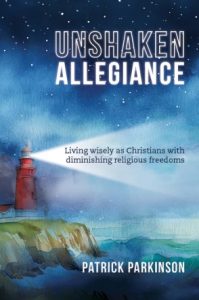“How should faithful Christians respond when the law increasingly conflicts with biblical convictions?”
This question has moved from theoretical to urgent as Australian Christian institutions face mounting legal challenges over gender identity, religious hiring, and sexual ethics. Professor Patrick Parkinson’s Unshaken Allegiance offers a timely and practical framework for thinking about these matters.
Last week (September 24th) brought news that the Independent Education Union (IEU) would take Sacred Heart Girls College in Oakleigh to court over the case of Myka Sanders, a teacher employed by the school. The school has refused Myka’s request to use a non-binary title “Mx” and preferred pronoun on the basis that affirming a non-binary identity would conflict with “Catholic anthropology”. At the Victorian Civil and Administrative Tribunal (VCAT) the Melbourne Archdiocese Catholic Schools (MACS) successfully argued that exemptions for religious schools in the Federal Sex Discrimination Act should be applied. The IEU has now taken the case to the magistrate’s court. (For a full discussion see Neil Foster “Pronouns, employment and religious schools” https://lawandreligionaustralia.blog/2025/09/27/pronouns-employment-and-religious-schools/)
This case highlights several of the themes of Unshaken Allegiance by Parkinson, who is a leading advocate for freedom of religion in Australia. The book is useful to help Christians understand their engagement with laws. Christian wisdom drawn from Scripture, mixed with Parkinsons legal insight and experience presented in a very readable style, makes this a unique book well worth buying.
The Sacred Hearts case demonstrates many of the themes of Unshaken Allegiance. Parkinson explains that the law can be both sword and shield. Anti-discrimination legislation can allow actions against religious bodies, especially over views of sex and gender, exemptions can protect the same bodies. The sword is often wielded by activist groups. The IEU has a position to limit exemptions, and this case is an opportunity to advance that cause. MACS had to take into consideration many of the issues Parkinson discusses as it determined whether to contest the case, and on what basis. The interplay of VCAT and court, and state and federal legislation shows the complexity of legal processes.
Unshaken Allegiance opens with a reflection on Parkinson’s time in the early 1980s with believers in Bratislava, then the capital of communist Czechoslovakia. Czech Christians found their lives strictly limited and controlled by the authorities, and Parkinson was impressed by their courage. They, in turn, were welcoming, but could not grasp how he, a Christian, could also be a lawyer. In their experience, lawyers and courts served the government. Parkinson points out that the tradition of independent courts and ‘the rule of law’ is a Christian, and particularly English tradition.
In the last decades, Australia and other English-speaking nations, have become more like his Czech experience, where there is a growing pressure on the free expression of faith and it may become difficult for an active Christian to train and work as a lawyer. Parkinson’s own experience is that public expression of Christian convictions can threaten career progress in the academy.
Parkinson does not equate Australia with communist Czechoslovakia: “we are not such a dire place, nor in most respects are we remotely close to it” (p5). Nevertheless, there are similarities which would have been unimaginable 40 years ago. This introduction sets the scene for a book which examines the rising challenges to freedom of religion and proposes a Christian response.
Parkinson claims not to have written a “theological” book, but a practical guide for pastors and church leaders and others in Christian organisations, and for Christians who want to think about their dual citizenship when the law can increasingly impinge on Christian expression. It turns out that it is probably more theological, and less practical, than you may imagine.
Although Parkinson does not set out a full theology of government and law, he grounds a great deal of his discussion in important biblical texts and theological principles. The discussion may leave readers wanting fuller biblical and theological foundation, yet it offers a handy introduction to key theological themes for Christian thinking on the topic.
On the other hand, the book is (obviously) not detailed legal advice, nor is it a play book of legal strategy. It offers an orientation to the issues of freedom of religion and legal processes with a great deal of Christian wisdom. The central question of the book is whether and to what extent Christians are morally obliged to obey laws which limit the expression of their faith.
Much of the discussion of law and cases is Australian, though Parkinson also draws from England and New Zealand with their similar cultures and legal systems. His discussion of legal matters with real life cases is one of the great strengths of the book. If you have had little exposure to the justice system, the book offers an accessible introduction.
The first part of the book sets out the challenges to freedom of religion in Western nations. This has a cultural basis, and the fullest discussion of the cultural developments come in the last chapter. Parkinson also sets out the kind of laws which often limit Christian expression: anti-discrimination laws, charity law, child protection legislation, hate speech laws, anti-vilification measures and laws against “conversion therapy”. In most cases, he notes the commendable intention of the laws and shows how they can be “weaponised” against religious expression by police, tribunals and activists.
Chapter 4 focuses on freedom of religion in human rights law. Human rights, including freedom of religion, have been encoded in the International Covenant of Civil and Political Rights (ICCPR) and protected in various ways in international and national laws. Parkinson explains that in practice governments are always required to consider how to balance rights which compete, or even conflict. He traces how Western governments and human rights organisations have favoured the individual right for non-discrimination over any rights for religious groups. The chapter finishes by highlighting that a concern for equality could be applied to core religious practices such as the selection of ordination candidates — it may turn out that it is not possible to insist that the pope must be Catholic!
For all his concerns about legal overreach, Parkinson is not cynical about government or law. At several points, he reminds us of New Testament instructions to obey governing authorities (Rom 13:1-4; 1 Pet 2:13-14), and the good which comes from a functional legal system (even an oppressive one). This theme means that Unshaken Allegiance is not alarmist. Parkinson suggests that even troublesome laws have some value (pp214-15). He reflects on believers in the Bible who refused to comply with unjust restrictions on their faith to encourage us to take a similar stance, yet he does not consider that Christians should be part of revolutions in Western democracy! He even sets out the case for obedience to unjust laws: “we benefit from order and stability — should we not accept that this comes at a price?” (p118). He also considers that “public civil disobedience”, which goes beyond conscientious refusal, may be appropriate in some circumstances.
Unshaken Allegiance particularly helps Christian leaders by showing the complex questions of obedience in the “modern administrative state”. Laws do not always operate with prohibitions and clear penalties for breaches; in the case of regulations and complaint-based mechanisms it is more difficult to determine what obedience requires. Parkinson suggests that Christians should seek to comply with such laws, but that often this will require a judgement as to how fully we should comply, especially when there can be inflated claims about the implications of regulatory law. In this discussion, he takes the Presbyterian Church of NSW response to WHS law as a case study. He sets out a series of considerations that are relevant for such a situation and implies that in his judgement the PCNSW could have taken a path of less rigorous compliance. (I am not sure that his summary is accurate on all the details, but the correct details would probably not change his judgement).
Part 3 deals directly with the conflicts between the law and Christian ministry. Parkinson warns Christians to “pick their battles” in the “culture wars” and warns against being unnecessarily proactive. He urges Christians to seek peace — and also warns of the financial and personal cost of legal actions. He also offers some practical strategies for dealing with intrusive law to avoid court.
Here Parkinson comes to the big question of the book and sets out key reasons why a Christian should resist a law: if it impedes ordinary Christian living, if it unreasonably limits evangelism, if there is a Christian consensus, and if the objection to the law is based in Christian convictions. The first two concerns are re-emphasised in the last chapter. Parkinson recognises that there is a place for non-compliance as protest — “civil disobedience” — but advises that quiet non-compliance is “the default option for living under oppressive regimes”.
If Christians do find themselves facing legal action, co-operating with an investigation or exercising the right to remain silent may both prove to be ways to avoid a trial. On the other hand, Parkinson points out that Paul’s example in Acts can encourage Christians that it is appropriate to offer a legal defence. This may be necessary when a complaint is vexatious or not clearly established, if mediation may lead to unwanted results or if the complainant will not accept a negotiated compromise (perhaps this was the judgement of MACS in the Sacred Heart case). A court case, costly as it is, may be the way to challenge legal overreach or to clarify the scope of a law.
In the final chapter, Parkinson reflects on possible developments in Western culture. The state may well seek to control churches even more fully. Parkinson also suggests that LGBTQ lobby groups are splintering and losing influence but suspects that Western nations will see a loss of confidence in liberal democracy and growing authoritarianism. (He suggests that elite education and large-scale migration are the key drivers of this — I suspect it is more complicated). In any case, Christians are called to live faithfully and seek the good of their community — including freedom of religion. More importantly, they are called to preach the gospel, and to continue to do that will require wisdom in dealing with government and the law.
Parkinson quotes the Westminster Confession 23.3 (p201) to illustrate the separation of church and state. Sadly, the quote is from the 1788 American amendment — the Westminster divines held a different view of the relation of the two kingdoms. More importantly, the book would benefit from a more satisfying fuller discussion of the biblical and theological basis for a commitment to a general freedom of religion in a pluralist society. Generally, I suspect Unshaken Allegiance will leave readers wanting to think further about political theology.
Unshaken Allegiance is a welcome contribution addressing a real need for Australian Christians. We can learn a great deal from Parkinson’s calm tone, realistic stance, biblical wisdom and commitment to Christian life and ministry.
